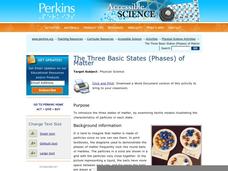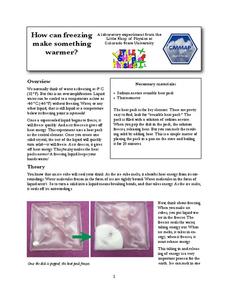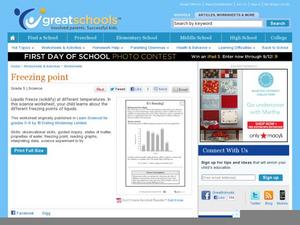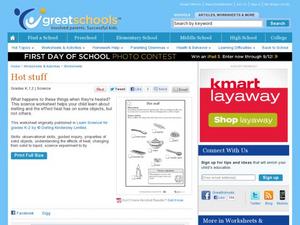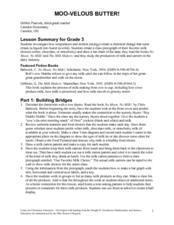Curated OER
Learning Lesson: Sweatin' to the Coldies
Students participate in a demonstration to show the change of water vapor to a liquid. They discuss the three states of matter. They examine flash flood safety to end the lesson plan.
Curated OER
Density of Rocks
Given a variety of rocks, junior geologists calculate densities and correlate them to Earth's layers. As a simulation of continental crust, they experiment with how materials of differing density float in water. Finally, they compare the...
Curated OER
A-Mazing Matter
A fun learning exercise with an unusual activity. Here, your students color-code the squares of liquids, solids, and gasses to discover the path in the maze for the robot rat to get to the cheese. Students color twenty-seven squares to...
Baylor College
What Is the Water Cycle?
Small groups place sand and ice in a covered box, place the box in the sunlight, then observe as evaporation, condensation, and precipitation occur. These models serve as miniature water cycles and demonstrations of the three phases of...
Perkins School for the Blind
The Three Basic States (Phases) of Matter
There are three basic states of matter: Solid, liquid, and gas. Help your learners with visual impairments to understand the chemical nature of each state of matter with tactile elements. Marbles are used to model the particles in each...
Curated OER
The Properties of Water: "Dead Or Alive"
Young scholars study the water cycle and create a booklet entitled: "Discover the Wonder of Water" They observe and record data regarding evaporation, condensation, and precipitation and how water moves from a solid to a liquid to a gas....
Colorado State University
How Can Freezing Make Something Warmer?
Crazy fact—freezing liquid actually gives off heat! Young scholars investigate the transfer of energy when liquids freeze using a chemical heat pack. The heat pack gives off heat as its liquid core freezes.
Virginia Department of Education
Heat Transfer and Heat Capacity
It's time to increase the heat! Young chemists demonstrate heat transfer and heat capacity in an activity-packed lab, showing the transitions between solid, liquid, and gaseous phases of materials. Individuals plot data as the changes...
NASA
States of Matter
Water, one of the basic needs of humans, is found in all three states of matter on Earth; no other planet—that we know of—possesses this quality. Here is a unit that allows learners to explore through experimentation what it takes to...
K12 Reader
Water Cycle
solid, liquid, and gas. The three different forms of water are the subject of the article used to assess reading comprehension. After reading the article, kids respond to a series of comprehension questions based on the text.
Curated OER
Science: The States of Matter
Third graders conduct experiments in matter to create chemical changes resulting in gases. By mixing solids and liquids, they create a chemical reaction and capture the gas in balloons. After observing the balloons fill with carbon...
Curated OER
It's Freezing!
Here is a good activity for 5th grade scientists. In it, they look at a bar graph that shows the freezing point for a variety of liquids. Then, they are given a scenario of a certain liquid melting and freezing, and must determine which...
Curated OER
Chemistry Day With Glitter Wands
First graders observe examples of the three states of matter and identify matter in each of the three states. They make glitter wands to remind them of the three states of matter: solid, liquid and gas. Pupils brainstorm and record...
Curated OER
Acrylic "Shingles"
Young artists of all ages create texture using dried slabs of pourable acrylic paint. They experiment with texture by turning a liquid into a solid and finally into a 3-D work of art. This lesson uses easy-to-find materials, and the...
Curated OER
Hot Stuff
Very young scientists who are learning about solids, liquids, melting, and freezing will use this worksheet to identify things that would melt if put in a warm place. There are eight objects altogether, and learners place a check mark...
Center for Learning in Action
Investigating Physical and Chemical Changes
Super scientists visit ten stations to predict, observe, and draw conclusions about the physical and chemical changes that occur when different states of matter—liquid, solid, and gas—are placed under a variety of conditions. To...
Cornell University
Density
Certain things just do not mix, including liquids of varying densities. Learners collect data to determine the densities of several liquids. They then use the density information to predict the type of liquid.
Curated OER
Moo-Velous Butter!
Third graders investigate how temperature and motion (energy) create a chemical change that turns cream ( a liquid) into butter (a solid). They create a class pictograph of their favorite mils choices (white, chocolate, or strawberry)...
Curated OER
Particles: Size Makes All the Difference
High schoolers plot particle sizes of common airborne materials on a log scale. They read an article on particle size and its relationship to the ability to pass through the lungs, into the bloodstream, and eventually into the cells of...
Science Friday
Capturing Carbon Dioxide
Why don't we just capture carbon dioxide in the air and store it somewhere else? A hands-on lesson allows scholars to explore a complex concept. First, they will create a carbonated beverage, and then they will determine if liquid...
Science 4 Inquiry
Battle of the Waves
Which travels faster, light or sound? Scholars work in groups to simulate the ability for waves to travel through solids, liquids, gases, and through a vacuum. Then, they learn about the properties of a mystery wave and must determine...
Curated OER
Dry Ice: Simply Sublime
A fascinating lesson on states of matter is here for your young scientists. Dry ice is used to challenge learners preconceived notions about how solids work. They discover all sorts of interesting facts about states of matter from...
Anglophone School District
Fluids: Force in Fluids
Discuss Archimedes' Principle and fluid forces with your young scientists as they describe the relationship between mass, volume, and density during a series of engaging activities. They use the Participle Theory of Matter to explore the...
Curated OER
Titration: Standardization of a Base and Analysis of Stomach Antacid Tablets
Titration experiments don't have to give your high schoolers a stomachache. Study the ways to titrate an acide with a base in an engaging science experiment, which involves creating solutions and performing titrations. Pupils prepare a...
Other popular searches
- Solids Liquids and Gases
- Solids Liquids Gases
- Solids and Liquids
- Solids, Liquids, Gases
- Solids, Liquids and Gases
- Solids Liquids Gas
- Solids Liquids
- Pictures Solids Liquids Gas
- Solids, Liquids, and Gases
- Solids Liquids and Gas
- Solids Liquids Gases Quiz
- Matter Solids Liquids






